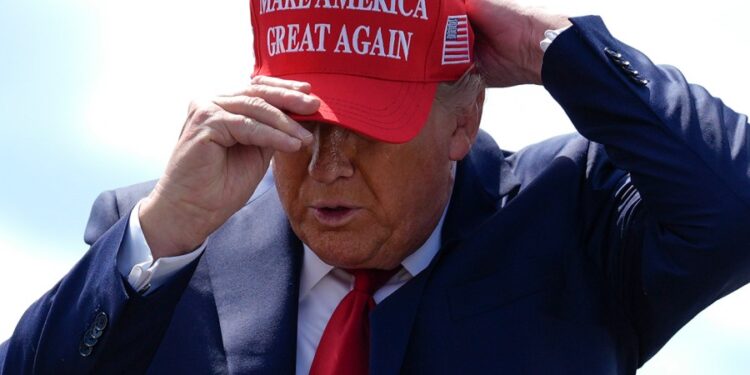
President-elect Donald Trump’s resounding victory signals a turning point for our nation. As America grapples with the consequences of unchecked diversity, equity and inclusion or DEI policies, the second Trump administration has a clear mandate to restore fairness and meritocracy in employment law.
For far too long, DEI initiatives have served as Trojan horses for leftist ideologies, undermining the principles of equal opportunity and creating a culture of fear and resentment in workplaces across the country. No sector exemplifies this better than Silicon Valley, where DEI has devolved into overt discrimination.
White and Asian engineers are often passed over for promotions to meet arbitrary diversity quotas, while businesses spend millions on mandatory “anti-racism” training that vilifies some employees just based on their skin color. These policies are not about fairness or inclusion; they are about imposing an ideological agenda that prioritizes identity politics over qualifications.
The incoming Trump administration now has a chance to dismantle this divisive framework and chart a course back toward unity and common sense.
At its core, DEI as currently practiced is antithetical to the principles of fairness and equality. Instead of leveling the playing field, it tilts it steeply in favor of select groups, creating a workplace culture where hiring and promotions are often dictated by identity rather than merit. DEI practices, though often cloaked in the language of equity, are nothing more than reverse discrimination, punishing individuals for their race or gender while undermining the very concept of merit-based achievement.
Beyond hiring practices, mandatory diversity training programs have become a tool of ideological coercion. Employers are often legally required to subject their employees to training sessions where they are told to “acknowledge their privilege” and confront their supposed complicity in systemic oppression. These programs do not foster understanding or collaboration; they sow division and resentment. The incoming administration must make it clear that no American worker should be forced to participate in ideological indoctrination simply to keep their job.
In his first term, President Trump set the stage for a reimagining of DEI, with his 2020 executive order banning federal contractors from conducting training that promoted divisive concepts like collective guilt based on race or sex. Although the order was rescinded by President Biden, it highlighted the need to challenge the left’s monopoly on defining workplace inclusivity. Trump’s second term provides an opportunity to not only restore this order but to go further by instituting a DEI framework rooted in conservative values.
There are several ways the administration can lead. First, it can enforce laws against “reverse discrimination,” which like all discrimination violates the Civil Rights Act of 1964. The Trump administration should prioritize enforcement of anti-discrimination laws in cases where DEI policies disadvantage individuals based on their race, gender or political beliefs. This includes actively supporting lawsuits against companies that enforce quotas or other discriminatory practices, particularly in industries like tech and academia where such policies are rampant.
Second, Trump can promote merit-based hiring and advancement. Meritocracy is the cornerstone of a thriving economy. Employment decisions should be based on skills, qualifications and performance — not identity. The Trump administration must make it clear that federally regulated industries and contractors will face penalties for using quotas or “diversity scorecards” as hiring criteria. Transparency in hiring and promotion processes should also be mandated to ensure fairness.
Third, The new administration can protect employees from ideological coercion. Workers should not be compelled to participate in training programs that demean them based on their race or gender. Trump can strengthen protections for employees who object to mandatory diversity training or other workplace programs that violate their conscience. New regulations could clarify that DEI initiatives must respect individual liberties and avoid ideological overreach.
Fourth, Trump can end the federal push for quotas. Federal agencies under the Biden administration pressured companies to meet diversity benchmarks as part of their contracting and compliance obligations. Trump’s second term must reverse this trend. Agencies like the Equal Employment Opportunity Commission and Department of Labor should focus on ensuring equal opportunity rather than enforcing equal outcomes.
Finally, Trump must address the “DEI Industrial Complex.” The rise of DEI consultants and ESG (environmental, social and governance) scorekeepers has created a lucrative industry dedicated to advancing progressive orthodoxy. The administration should investigate and regulate ESG criteria to ensure that corporate governance prioritizes shareholder value over ideological conformity.
Conservatives must reclaim DEI from the left and transform it into a framework that truly benefits all Americans. This doesn’t mean abandoning diversity; it means ensuring that diversity emerges naturally, through equal opportunity and economic growth, rather than being artificially imposed through quotas and mandates.
The second Trump administration can champion policies that expand opportunities for underserved communities without resorting to divisive identity politics. For instance, vocational training programs and initiatives like Opportunity Zones, which incentivize investment in economically distressed areas, have proven far more effective at uplifting individuals than any DEI mandate.
America’s workplaces must remain places of opportunity and collaboration, not battlegrounds for ideological warfare. DEI, as it currently stands, has created an environment of division, resentment and legal uncertainty. By focusing on merit, fairness and individual rights, the Trump administration can undo the damage wrought by years of identity politics and restore a culture of excellence and mutual respect.
The stakes are clear: Either we continue down the path of mandatory quotas, continue to allow reverse discrimination and require ideological conformity, or we return to the principles that have made America great: fairness, hard work and opportunity for all.
Under President Trump’s leadership, we can chart a new course for DEI in employment law. This is the vision America desperately needs and deserves.
John-Paul S. Deol is a partner and leader of the nationwide Employment Law Practice Group at Dhillon Law Group.







